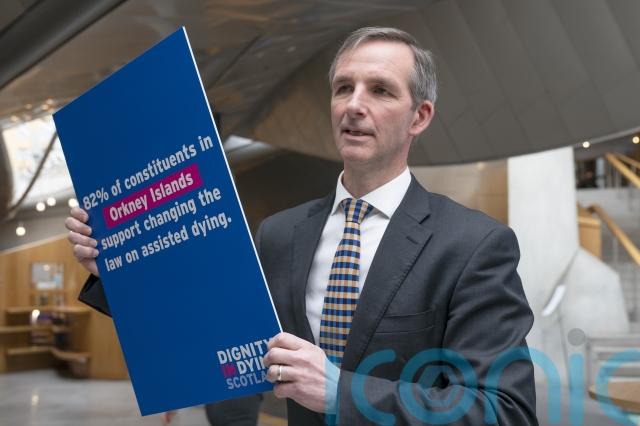
Conscientious objection provisions in assisted dying legislation could result in those looking to end their lives going “doctor shopping”, MSPs have been told.
With Holyrood now scrutinising proposals to legalise assisted dying for adults with a terminal illness in Scotland, Holyrood’s Health Committee heard how people might switch doctors to try to find a medic who would approve an assisted death for them.
As it stands the legislation, put forward by Liberal Democrat MSP Liam McArthur, allows medical professionals who are opposed to the practice to opt out of taking part.
But on the issue of conscientious objection, Stephanie Fraser, the chief executive of Cerebral Palsy Scotland, told MSPs: “I think what would concern us is the doctor shopping.
“You then end up with: ‘If my doctor won’t do this how do I get to another doctor.'”
She raised concerns about “inequality geographically” if there was an area where few doctors were prepared to help with assisted deaths, raising here the potential for problems “for people who already have difficulty with movement travelling with wherever they need to go to”.

Marianne Scobie of the Glasgow Centre for Inclusive Living also said that “sometimes people might be doctor shopping in relation to finding a doctor that would classify them as eligible”.
Her comments came as she argued that “legislative creep is an inevitable consequence of legalising assisted dying” – raising fears that the eligibility criteria could be widened.
As it stands the Bill sets out that people could request an assisted death if they are aged 16 or over and are suffering from an “advanced and progressive disease, illness or condition from which they are unable to recover and that can reasonably be expected to cause their premature death”.
But Ms Scobie argued people with terminal illnesses could continue to “live well” with the right support.
She told MSPs on the Health, Social Care and Sport Committee: “Many people when they are given a diagnosis, their immediate thought is: ‘I don’t want to live any more, I would rather die than go through a terminal illness’.”
But she added: “Actually with the right support in terms of healthcare, mental healthcare, and peer support, many people can live with a terminal condition and live well.
“We would be promoting the fact that people should be supported to live well while they are dying, including with a terminal illness.
“And we are further concerned that the legislation might widen out to include people who are not terminally ill.”
Tomorrow morning we'll continue taking evidence on the Assisted Dying for Terminally Ill Adults Bill.
We'll hear from: @alzscot, @CpScotland, @MNDScotland, @GDA__online, @DEScotTweets and @GCIL_DPO.
Agenda: https://t.co/B8OxH0lwNZ
Watch live from 9am: https://t.co/MzTdjGBAOS pic.twitter.com/ez1ve55xe8
— Health, Social Care and Sport Committee (@SP_HSCS) January 13, 2025
Meanwhile, Tressa Burke, the chief executive of Glasgow Disability Alliance, said the definition in the Bill could allow disabled people to seek an assisted death.
She said: “Glasgow Disability Alliance members were concerned that the definition was something that would apply to many disabled people.
“The language used in the Bill’s definition of terminal illness makes no mention of advanced and progressive terminal illness, so we felt very much the definition could apply to disabled people.
“We have members, almost 6,000 disabled members spanning a full range of conditions and impairments.
“There are so many conditions that could fit with this definition and the worry we have at this point is discrimination and prejudice are endemic in society, and despite any best effort no law is immune from that, so we’re very concerned that the definition is too wide and that many disabled people will fall under it.”
However, MSPs were also told many people with motor neurone disease (MND) could be prevented from accessing an assisted death as the legislation would require them to be able to self-administer the drugs necessary to end their life.
Susan Webster, the head of policy and campaigns at MND Scotland said: “We do feel that if self-administration is the only option then it will impact on people with MND being able to access assisted dying.
“It is a progressive, debilitating illness. It is very, very quickly progressive, from the outset people can struggle to use their hands, other people can struggle to speak and to swallow.
“Really in terms of self-administration it is a concern, you could have quite a large population that are unable to access it.”
As a result, she said the legislation could “exclude many, many people with MND”, or could result in them seeking an assisted death “much earlier than they would choose to, so they are actually physically able to do what is required of them”.
Mr McArthur said: “Public polling is clear that Scots both with and without a disability are overwhelmingly in favour of a change in the law to allow terminally ill people the choice of an assisted death.”
Speaking about his Assisted Dying for Terminally Ill Adults (Scotland) Bill, the Lib Dem MSP added: “I am confident that my proposals represent a robust and well safeguarded Bill, allowing Scots access to the choice of an assisted death if they have an advanced, progressive terminal illness and the mental capacity to make the decision.
“Likewise protections in the Bill ensure that no doctor or medical professional will be compelled to take part. In a Bill that underscores choice, that is entirely appropriate.”
Subscribe or register today to discover more from DonegalLive.ie
Buy the e-paper of the Donegal Democrat, Donegal People's Press, Donegal Post and Inish Times here for instant access to Donegal's premier news titles.
Keep up with the latest news from Donegal with our daily newsletter featuring the most important stories of the day delivered to your inbox every evening at 5pm.